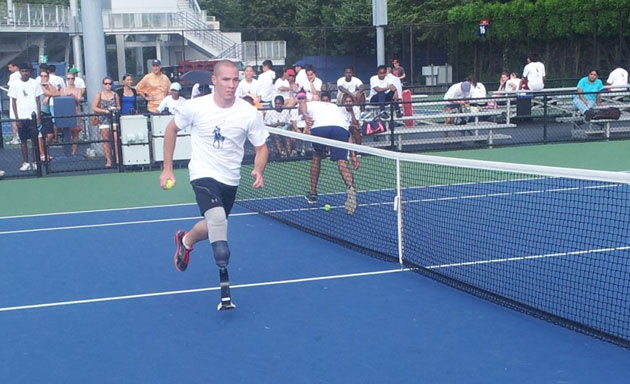Inspiring story of a U.S. Open ball boy
-

If you're one of the 250 people chosen to serve as a ball person at the U.S. Open, here's what you can look forward to: long hours spent in perpetual, knee-creaking vigilance, and chasing down errant shots and missed serves in speed and silence. All this for $7.75 an hour. Above all, do your best to be neither seen nor heard.
For most ball people, that anonymity isn't a tough challenge. They do their jobs so fast they've left your mind before the next point even starts.
Most, but not all. Meet Ryan McIntosh, a 23-year-old ball boy from Texas. He's an Army veteran who's doing everything his colleagues are doing even though he lost a leg in Afghanistan. And, like so many in his position, he's not letting the prosthesis below his right knee define him:
"I don't look at myself as being disabled or handicapped or anything else,"
"I want to experience everything, and live life to the fullest."
He's doing exactly that; a family man and a counselor helping soldiers at Fort Sam Houston deal with newfound disabilities, he's a shining example of how there's grace in even the worst moments of your life.
For McIntosh, a Colorado high school athlete, the day around which his life now revolves was December 8, 2010.
[H]is unit was walking single file through the Arghandab River Valley, not far from Kandahar, led by a soldier sweeping for mines, a football field away from the base. McIntosh was sixth in the procession. The area is known to be extremely dangerous. McIntosh lifted up his right foot and took his next step and put it down on top of a land mine, and in an instant came a blast that launched him 10 feet in the air. He landed in a ditch. He crawled out. He looked down and saw part of his foot was gone. He never lost consciousness.
Only later did McIntosh find out that there were 40 pounds of homemade explosives beneath the mine that never detonated.
"I would've been a goner," McIntosh said.
His leg was amputated below the knee. He immediately began rehabbing both body and mindset, competing in various events designed for Paralympic athletes such as himself. Last May, through the United States Tennis Association's Military Outreach program, he tried out for a ball person's role, and here he is, center stage for one of tennis' marquee events.
And while he admits to psychological difficulties -- fireworks like those that opened the U.S. Open are "gut-wrenching" even to this day, he says -- his path is clear: Flushing Meadows now, the Paralympics in Rio de Janeiro in 2016.
Impressive work for someone who's been through all he has, even if McIntosh would probably prefer you didn't think of him that way.